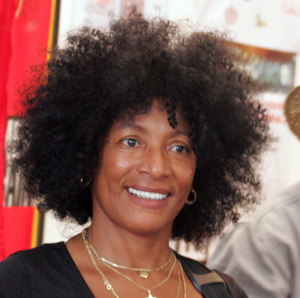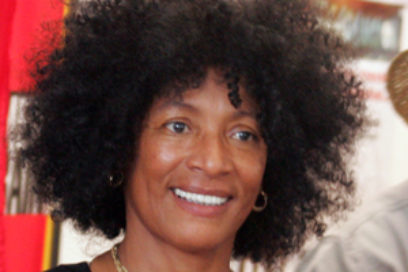 “I am a Cuban living in the world”, said Josefina Sanchez Bazan, who is well known for her defense to the just causes and her way to present herself. She is fan to fight for the freedom of the Cuban Five, as she used to do it for the return of Elian Gonzalez. She usually dresses in red for the political activities; she is black, slender, wears an unkempt hair do and she is always smiling, so you can easily identify her.
“I am a Cuban living in the world”, said Josefina Sanchez Bazan, who is well known for her defense to the just causes and her way to present herself. She is fan to fight for the freedom of the Cuban Five, as she used to do it for the return of Elian Gonzalez. She usually dresses in red for the political activities; she is black, slender, wears an unkempt hair do and she is always smiling, so you can easily identify her.
Josefina Sanchez Bazan travels from one country to another doing her job, though she lives in Vienna, Austria with her family. “I never left Cuba, I travel to Cuba and return to Vienna. It has been always like that since 1995. When I arrived to Europe I joined the Austrian-Cuban Friendship Association and started collaborating.
“I participate in all the activities scheduled, in projects for hospitals, schools; collect funds to send medical equipments to Cuba, school materials, and other things. She works at the Archdioceses from Vienna, a contract hard to get because, as I was divorced before, they did not want to admit me, but we Cubans are admired worldwide and a cardinal, whom they call the Red Cardinal, defended me telling them they needed me in that project.
“Australian church is very rich; I did social work in an organization in charged to help children from the street and those women suffering violence and exploitation. We have collaborated in Asia, Africa and Latin America. Knowing such violence, poverty and neglect, I learned to love even more my country and value our society.
“Once I got a lot depressed, and a nun told me she did not understand why I was crying if I came from a poor country. I answered her that Cuban poverties are different: we are rich poor people, because we neither have children abandoned on the streets, nor exploited women, nor we need to collect money to take a child to see a doctor. I explained our characteristics; that we are always happy and that she should visit Cuba to understand it. And she started understanding me.
“The first time I traveled to the United States (U.S.) to work, I had my Cuban passport and they hold me for five hours at the airport; it was incredible how the Austrian women defended me in solidarity gesture, moved the entire world and they finally let me in the U.S.
Letters to Gerardo
“When in 2001 I knew there were five Cubans held in the U.S., unjustly accused of espionage, we already had the experience of the return of the child Elian Gonzalez. The year after, I started writing them; perhaps for the excessive sentences he has, I identified myself more with Gerardo; I insistently sent him letters until two years ago, when I received the first answer. He was very affectionate and he called me sister Josefina.
I told him I wanted to do something big for them, but I was a simple adventurous Cuban that goes around the world and that I did not have a net to get an impact. He told me to approach Alicia Jrapko, one of the leaders of the International Committee for the Freedom of the Cuban Five. That very day I got in touch with her, she noted she was kind of a secretary for Gerardo and I offer to be too, without wage, of course; I started collaborating and we have grown as a family.
We have to win the battle in the U.S.
“We are aware that we have to win the battle for the return of Gerardo, Tony, Ramon and Fernando in the U.S. It is right there where we have to break the wall of silence. Cubans living in Europe used to do many activities, we chanted in front of the U.S. embassy, but no one heard us, not even the press cared about us.
“In Niza, a journalist interviewed me on the Cuban Five and the following day called me to tell me her editor-in-chief denied her the publishing of the text telling her that if they do it, they will be both fired from the newspaper.
“I was in the first activity we did in Washington, in May this year. I believe it has been the most significant thing we have done for their return. It was very excited to see so many Americans committed; it was really surprising. The activities ended at 3 o’clock in the morning, and at 5 that very morning, the Americans that shared my room were in front of their computers telling the world what had happened the day before and preparing the activities of that day. That was pretty moving for my heart.
“I will keep on with my Collection Box project, because in the U.S. , you can do nothing without money and we need money to make the struggle become stronger.
Last year I made that call in the Colloquium held in Holguin, Cuba; if every member of in solidarity with Cuba abroad contributes with € 20.00 a month, many things can be achieved. I started with my own family: my daughters, my husband and I contributed with € 480.00 we hand in to the International Committee annually.
“Mirta, Tony’s mother breaks my heart. Every time we meet, she says: ´Josefina, hurry because time is running out, try, if you can, with news in The Washington Post´. Her request makes greater my commitment.
“I am always in all the manifestations programmed worldwide for the release of our brothers. I am not afraid of the reprisals. Do you know why? I think about Chavez and Fidel, in the risks they took. I have been in the U.S. several times, in one of them I went to Versalles, to Calle 8 itself, in Miami, where the most declared anti-Cuban enemies meet and I delivered propagandas of the Cuban Five; one guy insulted me a lot, but he continued as if nothing had happened.
“In Vienna I made a call to the Latin Americans to march in solidarity with Cuba. I asked them to wear a scarf with the image of Che Guevara. It was dangerous because you can be fired from work. In another occasion, my husband, two Austrians and I marched on May Day dressed in white. We call the attention of the media, because we were confused with the Ladies in White; when they asked to interview us, we talked about the Cuban Five and Cuba . It was extraordinary; they were hoist by their own petard.
“Another important moment was the manifestation organized by the Austrians when a bank bought by the Americans, closed the saving accounts to the Cubans and the Latin Americans living in that country. When I knew about it, I traveled from France to Vienna, I joined the strike wearing on my dress, a letter of claim which we made a copy of it and handed in to the mayor of the city.
“There was a quickly reaction; they told the American official that the blockade against Cuba could be in the U.S., but not in Austria . Thanks to their support they lifted the sanction. As you can see, the blockade is not only in Cuba. It can affect Cubans worldwide.”
My commitment is with the Cuban Five and Chavez
In all political activities, Josefina Sanchez Bazan is completely dressed in red, and she has a sacred inspiration to do it. “I met Commander Hugo Chavez in 2006, in the Summit of the Bolivarian Alternative for the Americas in Vienna. I was one of the organizers of the meeting and I was always in front of him, chanting.
One day in the middle of the rejoicing, Chavez, who was in the tribune together with Evo Morales called me, when I approached to him, he kissed and hugged me and said: “I hope Fidel does not feel jealous with me.” He turned to Evo and said: “We do not have time to feel in love anymore, look at this!”
“I told him my dream was to meet and kiss him, and as nice as he used to be, he answered: “but you did not tell me, I had to ask you to come.” And he said that as symbol of solidarity between Cuba and Venezuela, he will give me a button from his shirt as a gift; then we started: “Get it out” and I said: “No keep it”. And finally he gave it to me and I will eternally keep it. In that moment I joined him to lay a wreath of flowers at the foot of Jose Marti Monument in Vienna.
“When Maduro announced Chavez’ death, my throat closed, I could not say a word. Since then on, I promised to dress in red in all political events, in honor to his memory. My commitment is with the Cuban Five and with Chavez.”


